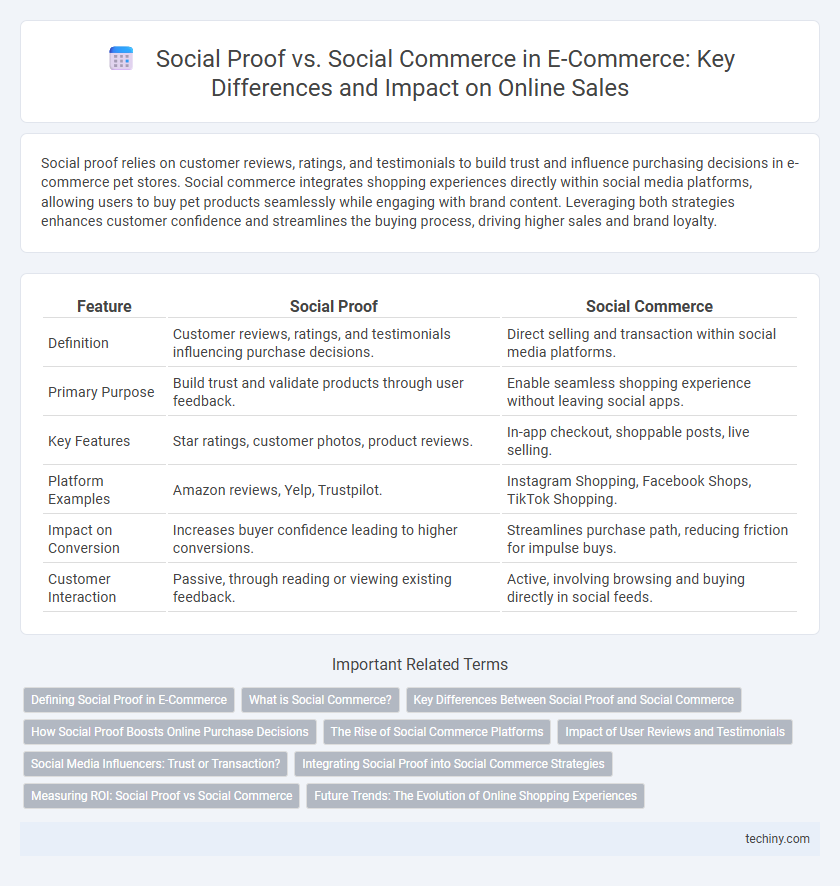Social proof relies on customer reviews, ratings, and testimonials to build trust and influence purchasing decisions in e-commerce pet stores. Social commerce integrates shopping experiences directly within social media platforms, allowing users to buy pet products seamlessly while engaging with brand content. Leveraging both strategies enhances customer confidence and streamlines the buying process, driving higher sales and brand loyalty.
Table of Comparison
| Feature | Social Proof | Social Commerce |
|---|---|---|
| Definition | Customer reviews, ratings, and testimonials influencing purchase decisions. | Direct selling and transaction within social media platforms. |
| Primary Purpose | Build trust and validate products through user feedback. | Enable seamless shopping experience without leaving social apps. |
| Key Features | Star ratings, customer photos, product reviews. | In-app checkout, shoppable posts, live selling. |
| Platform Examples | Amazon reviews, Yelp, Trustpilot. | Instagram Shopping, Facebook Shops, TikTok Shopping. |
| Impact on Conversion | Increases buyer confidence leading to higher conversions. | Streamlines purchase path, reducing friction for impulse buys. |
| Customer Interaction | Passive, through reading or viewing existing feedback. | Active, involving browsing and buying directly in social feeds. |
Defining Social Proof in E-Commerce
Social proof in e-commerce refers to the influence that customer reviews, ratings, testimonials, and user-generated content have on purchasing decisions. It leverages social validation to build trust and credibility, encouraging potential buyers to convert based on others' experiences. Effective implementation of social proof can significantly increase conversion rates and reduce cart abandonment.
What is Social Commerce?
Social commerce integrates social media platforms directly with e-commerce, enabling users to discover, share, and purchase products seamlessly within the social environment. It leverages features like shoppable posts, in-app checkout, and user-generated content to enhance the online shopping experience. This approach increases customer engagement, streamlines the purchase process, and drives higher conversion rates compared to traditional e-commerce methods.
Key Differences Between Social Proof and Social Commerce
Social proof refers to the influence that customer reviews, ratings, and testimonials have on purchasing decisions within e-commerce platforms, enhancing trust and credibility. Social commerce integrates shopping experiences directly into social media channels, enabling users to browse and buy products without leaving the platform. The key difference lies in social proof's role as a trust-building mechanism, while social commerce functions as a transactional ecosystem that combines social interaction with seamless purchasing.
How Social Proof Boosts Online Purchase Decisions
Social proof, such as customer reviews, ratings, and testimonials, significantly influences online purchase decisions by building trust and reducing buyer hesitation. User-generated content and social media recommendations create authentic validation that drives higher conversion rates in e-commerce platforms. Integrating social proof elements effectively enhances customer confidence, leading to increased sales and stronger brand loyalty.
The Rise of Social Commerce Platforms
Social commerce platforms have revolutionized online shopping by integrating social proof elements such as customer reviews, ratings, and user-generated content directly into the purchasing experience. These platforms leverage real-time interactions and social validation to boost consumer trust and increase conversion rates, surpassing traditional social proof methods. As consumer behavior shifts towards interactive and community-driven buying, major players like Instagram Shopping, Facebook Shops, and TikTok Shopping dominate the market, driving unprecedented growth in social commerce sales worldwide.
Impact of User Reviews and Testimonials
User reviews and testimonials significantly influence purchasing decisions by increasing trust and credibility in e-commerce platforms. Social proof, exemplified through authentic customer feedback, boosts conversion rates by reassuring potential buyers about product quality and service reliability. Integrating user-generated content within social commerce environments enhances engagement and drives sales by creating interactive, community-driven shopping experiences.
Social Media Influencers: Trust or Transaction?
Social media influencers leverage trust built through authentic content and engagement, making their endorsements a powerful form of social proof that can sway purchasing decisions. In social commerce, these influencers transition from mere trust symbols to direct drivers of transaction by integrating shoppable features within platforms like Instagram and TikTok. This seamless blend of credibility and convenience accelerates conversion rates, illustrating how influencer marketing bridges social proof and transactional e-commerce effectively.
Integrating Social Proof into Social Commerce Strategies
Integrating social proof into social commerce strategies enhances customer trust by showcasing authentic reviews, ratings, and user-generated content directly within the shopping experience. Leveraging social proof elements like testimonials and influencer endorsements increases conversion rates and reduces cart abandonment in e-commerce platforms. Effective social commerce solutions embed these validations seamlessly, creating a community-driven environment that boosts engagement and drives sales.
Measuring ROI: Social Proof vs Social Commerce
Measuring ROI in social proof involves tracking metrics such as conversion rate increases, customer trust scores, and user-generated content engagement to quantify its impact on sales. Social commerce ROI measurement focuses on direct revenue attribution, analyzing product clicks, in-app purchases, and cart conversions driven by integrated social shopping features. Both strategies require distinct analytics tools: social proof relies on sentiment analysis and social listening, while social commerce depends on e-commerce platform analytics and transaction data.
Future Trends: The Evolution of Online Shopping Experiences
Social proof integrates customer reviews, ratings, and testimonials to build trust and influence purchase decisions, while social commerce enables direct buying through social media platforms, blending social interaction with seamless transactions. Future trends indicate an increasing convergence of AI-driven personalization and immersive technologies like AR/VR to enhance social commerce, creating more interactive and trustworthy shopping experiences. The evolution of online shopping will hinge on leveraging social proof within social commerce ecosystems to drive engagement and boost conversion rates.
Social proof vs Social commerce Infographic

 techiny.com
techiny.com